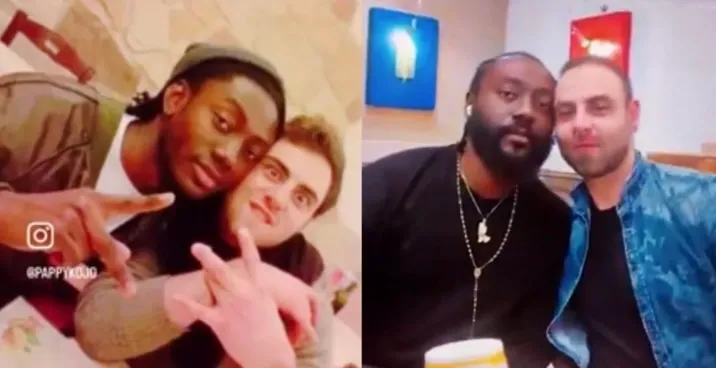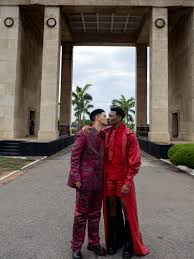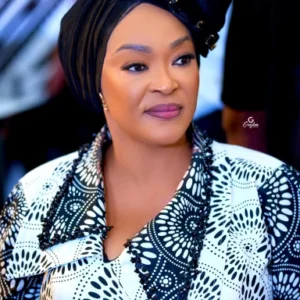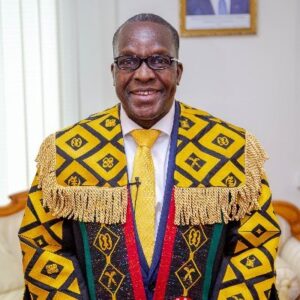Rapper Pappy Kojo Marks 20 Years Together with His Partner”

Ghanaian rapper Pappy Kojo has generated a significant amount of attention and controversy on social media with a bold post suggesting he has been in a romantic relationship with a male partner for the past two decades. The post, shared on January 26, 2025, via X (formerly Twitter), included a video featuring two photos of Pappy Kojo and the individual, showcasing their 20-year transformation together. Accompanying the images was the caption: “20 years with my gay partner,” a statement that has since sparked intense discussions online.
The rapper’s declaration has raised eyebrows in a country where LGBTQ+ issues remain a sensitive and often divisive topic. In Ghana, same-sex relationships are not widely accepted, and the public discourse around LGBTQ+ rights has often been met with resistance. Pappy Kojo’s post, however, has ignited a mixed reaction from social media users, reflecting the broader societal tensions surrounding sexual orientation and identity in the country.
On one hand, some supporters of the rapper have hailed his post as a courageous and empowering statement. By openly sharing his relationship with a male partner, Pappy Kojo is seen by many as challenging the prevailing stigma against same-sex relationships in Ghana. His 20-year commitment, shared with the public, also resonates with those advocating for more openness and acceptance of diverse sexual orientations. For these individuals, the rapper’s public revelation serves as a reminder that love, in all its forms, deserves recognition and respect.
However, despite these messages of support, the post has also been met with a significant amount of backlash. Many social media users have strongly criticized Pappy Kojo, reflecting the deeply entrenched opposition to LGBTQ+ issues in Ghanaian society. The rapper’s decision to publicly acknowledge his same-sex relationship has triggered negative reactions from individuals who oppose the normalization of LGBTQ+ rights, especially in a culture where traditional values and religious beliefs often play a key role in shaping public attitudes.
Some critics expressed their discomfort and disapproval of the rapper’s post, citing Ghana’s cultural and religious values, which generally do not align with the acceptance of same-sex relationships. In many parts of the country, LGBTQ+ individuals face discrimination, and same-sex relationships are considered taboo or immoral by certain segments of the population. The backlash highlights the ongoing struggle for LGBTQ+ rights in Ghana, where even small steps toward visibility can provoke fierce opposition.
The intense reactions to Pappy Kojo’s post are a reflection of the broader societal divide over LGBTQ+ rights in Ghana. While progress has been made in some areas of the world regarding the acceptance of same-sex relationships, Ghana remains a country where LGBTQ+ individuals often find themselves marginalized and subject to prejudice. The rapper’s post has sparked important conversations about identity, love, and the right to live authentically, yet it has also shed light on the significant challenges that many LGBTQ+ individuals continue to face in Ghana.
Pappy Kojo’s revelation also highlights the tension between personal identity and societal norms. While some individuals in the country may admire his bravery in publicly declaring his relationship, others view it as a direct challenge to the deeply held cultural and religious values that shape their views on relationships and family life. The rapper’s decision to come out in such a public manner has forced the issue of LGBTQ+ rights back into the national conversation, urging people to reconsider their beliefs and attitudes toward same-sex relationships.
Pappy Kojo’s post has sparked an important and ongoing debate in Ghana about LGBTQ+ rights and societal acceptance. While some see his actions as a positive step forward in the fight for equality and inclusion, others view it as an affront to cultural and religious traditions. The rapper’s bold statement serves as a reminder of the work that still needs to be done in the country to ensure that all forms of love are respected and accepted, regardless of sexual orientation.







